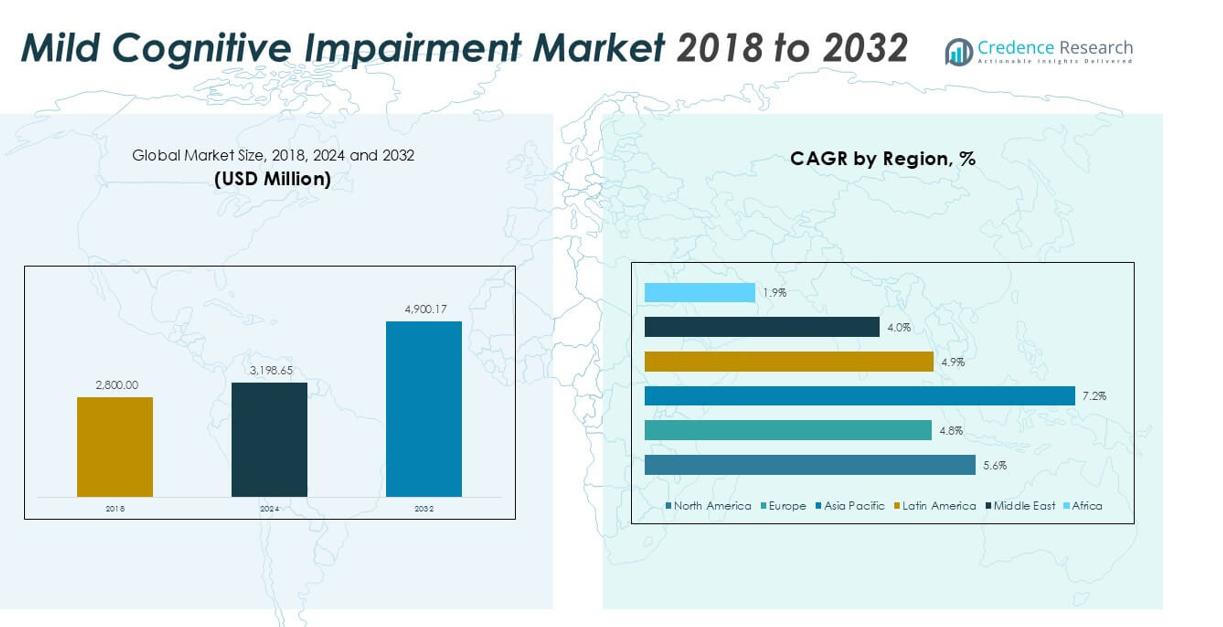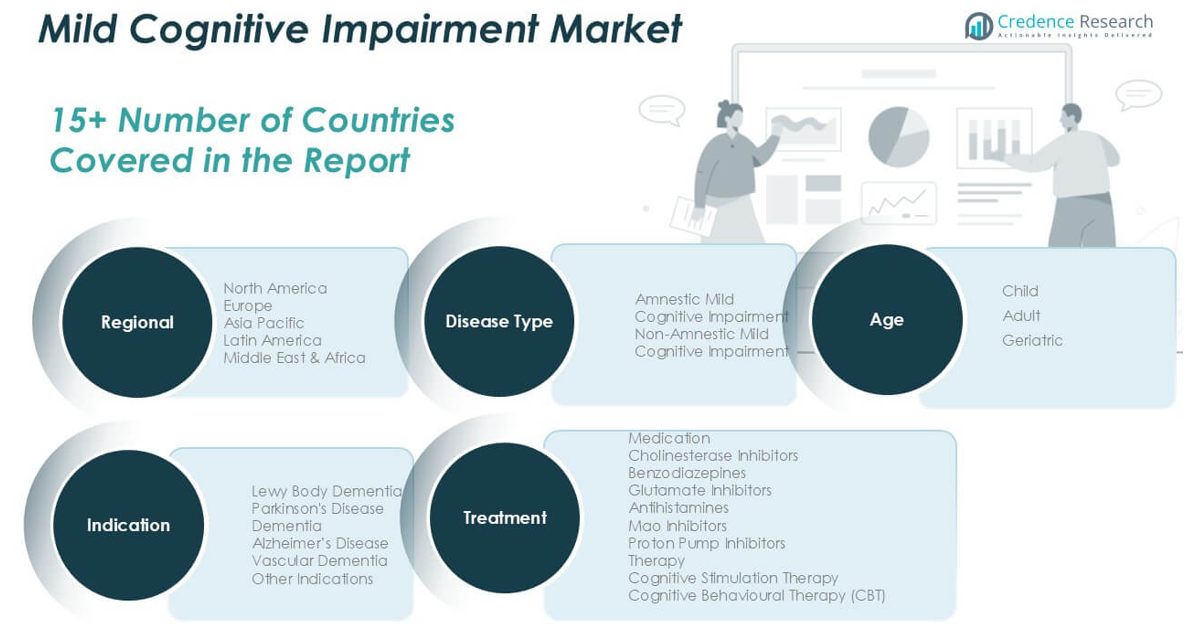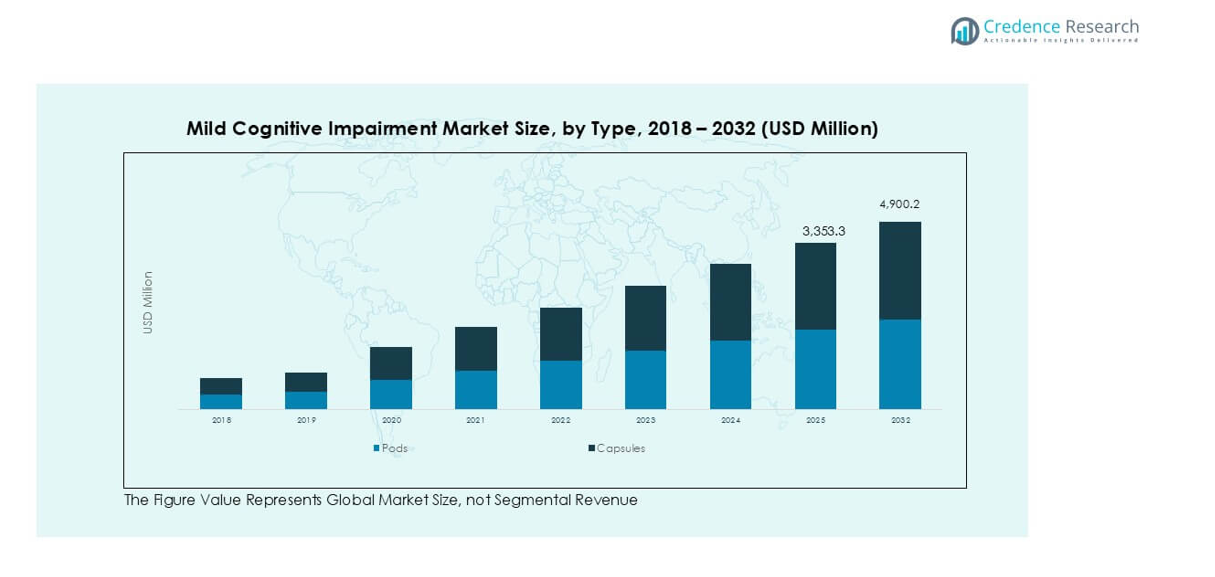HAPTER NO. 1 : INTRODUCTION 26
1.1. Report Description 26
Purpose of the Report 26
USP & Key Offerings 26
1.2. Key Benefits for Stakeholders 27
1.3. Target Audience 27
CHAPTER NO. 2 : EXECUTIVE SUMMARY 28
CHAPTER NO. 3 : MILD COGNITIVE IMPAIRMENT MARKET FORCES & INDUSTRY PULSE 30
3.1. Foundations of Change – Market Overview 30
3.2. Catalysts of Expansion – Key Market Drivers 32
3.2.1. Momentum Boosters – Growth Triggers 33
3.2.2. Innovation Fuel – Disruptive Technologies 33
3.3. Headwinds & Crosswinds – Market Restraints 34
3.3.1. Regulatory Tides – Compliance Challenges 35
3.3.2. Economic Frictions – Inflationary Pressures 35
3.4. Untapped Horizons – Growth Potential & Opportunities and Strategic Navigation – Industry Frameworks 36
3.5. Market Equilibrium – Porter’s Five Forces 37
3.6. Ecosystem Dynamics – Value Chain Analysis 39
3.7. Macro Forces – PESTEL Breakdown 41
CHAPTER NO. 4 : COMPETITION ANALYSIS 43
4.1. Company Market Share Analysis 43
4.1.1. Global Mild Cognitive Impairment Market Company Revenue Market Share 43
4.2. Strategic Developments 45
4.2.1. Acquisitions & Mergers 45
4.2.2. New Drug Launch 46
4.2.3. Agreements & Collaborations 47
4.3. Competitive Dashboard 48
4.4. Company Assessment Metrics, 2024 49
CHAPTER NO. 5 : GLOBAL MARKET ANALYSIS, INSIGHTS & FORECAST, BY DISEASE TYPE 50
CHAPTER NO. 6 : GLOBAL MARKET ANALYSIS, INSIGHTS & FORECAST, BY AGE 54
CHAPTER NO. 7 : GLOBAL MARKET ANALYSIS, INSIGHTS & FORECAST, BY INDICATION 58
CHAPTER NO. 8 : GLOBAL MARKET ANALYSIS, INSIGHTS & FORECAST, BY TREATMENT 62
CHAPTER NO. 9 : GLOBAL MARKET ANALYSIS, INSIGHTS & FORECAST, BY REGION 68
CHAPTER NO. 10 : NORTH AMERICA MARKET ANALYSIS, INSIGHTS & FORECAST, BY COUNTRY 73
10.1. North America Market Analysis, Insights & Forecast, by Disease Type 75
10.2. North America Market Analysis, Insights & Forecast, by Age 76
10.3. North America Market Analysis, Insights & Forecast, by Indication 77
10.4. North America Market Analysis, Insights & Forecast, by Treatment 78
CHAPTER NO. 11 : EUROPE MARKET ANALYSIS, INSIGHTS & FORECAST, BY COUNTRY 79
11.1. Europe Market Analysis, Insights & Forecast, by Disease Type 82
11.2. Europe Market Analysis, Insights & Forecast, by Age 83
11.3. Europe Market Analysis, Insights & Forecast, by Indication 84
11.4. Europe Market Analysis, Insights & Forecast, by Treatment 85
CHAPTER NO. 12 : ASIA PACIFIC MARKET ANALYSIS, INSIGHTS & FORECAST, BY COUNTRY 86
12.1. Asia Pacific Market Analysis, Insights & Forecast, by Disease Type 89
12.2. Asia Pacific Market Analysis, Insights & Forecast, by Age 90
12.3. Asia Pacific Market Analysis, Insights & Forecast, by Indication 91
12.4. Asia Pacific Market Analysis, Insights & Forecast, by Treatment 92
CHAPTER NO. 13 : LATIN AMERICA MARKET ANALYSIS, INSIGHTS & FORECAST, BY COUNTRY 93
13.1. Latin America Market Analysis, Insights & Forecast, by Disease Type 96
13.2. Latin America Market Analysis, Insights & Forecast, by Age 97
13.3. Latin America Market Analysis, Insights & Forecast, by Indication 98
13.4. Latin America Market Analysis, Insights & Forecast, by Treatment 99
CHAPTER NO. 14 : MIDDLE EAST MARKET ANALYSIS, INSIGHTS & FORECAST, BY COUNTRY 100
14.1. Middle East Market Analysis, Insights & Forecast, by Disease Type 103
14.2. Middle East Market Analysis, Insights & Forecast, by Age 104
14.3. Middle East Market Analysis, Insights & Forecast, by Indication 105
14.4. Middle East Market Analysis, Insights & Forecast, by Treatment 106
CHAPTER NO. 15 : AFRICA MARKET ANALYSIS, INSIGHTS & FORECAST, BY COUNTRY 107
15.1. Africa Market Analysis, Insights & Forecast, by Disease Type 110
15.2. Africa Market Analysis, Insights & Forecast, by Age 111
15.3. Africa Market Analysis, Insights & Forecast, by Indication 112
15.4. Africa Market Analysis, Insights & Forecast, by Treatment 113
CHAPTER NO. 16 : COMPANY PROFILE 114
16.1. Pfizer Inc. 114
16.2. Hoffman La Roche Ltd. 117
16.3. Nestlé Health Science 117
16.4. Reddy’s Laboratories Ltd. 117
16.5. Hikma Pharmaceuticals PLC 117
16.6. Sun Pharmaceuticals Ltd. 117
16.7. Johnson & Johnson Services, Inc. 117
16.8. Teva Pharmaceutical Industries Ltd. 117
16.9. Takeda Pharmaceutical Company Limited 117
16.10. Merck & Co Inc. 117
16.11. Company 12 117
16.12. Company 13 117
16.13. Company 14 117
List of Figures
FIG NO. 1. Mild Cognitive Impairment Market Revenue Share, By Disease Type, 2024 & 2032 50
FIG NO. 2. Market Attractiveness Analysis, By Disease Type 51
FIG NO. 3. Incremental Revenue Growth Opportunity by Disease Type, 2024 – 2032 52
FIG NO. 4. Mild Cognitive Impairment Market Revenue Share, By Age, 2024 & 2032 54
FIG NO. 5. Incremental Revenue Growth Opportunity by Age, 2024 – 2032 55
FIG NO. 6. Incremental Revenue Growth Opportunity by Age, 2024 – 2032 56
FIG NO. 7. Mild Cognitive Impairment Market Revenue Share, By Indication, 2024 & 2032 58
FIG NO. 8. Market Attractiveness Analysis, By Indication 59
FIG NO. 9. Incremental Revenue Growth Opportunity by Indication, 2024 – 2032 60
FIG NO. 10. Mild Cognitive Impairment Market Revenue Share, By Treatment, 2024 & 2032 62
FIG NO. 11. Market Attractiveness Analysis, By Treatment 63
FIG NO. 12. Incremental Revenue Growth Opportunity by Treatment, 2024 – 2032 64
FIG NO. 13. Mild Cognitive Impairment Market Revenue Share, By Region, 2024 & 2032 68
FIG NO. 14. Market Attractiveness Analysis, By Region 69
FIG NO. 15. Incremental Revenue Growth Opportunity by Region, 2024 – 2032 70
FIG NO. 16. Mild Cognitive Impairment Market Revenue Share, By Country, 2024 & 2032 73
FIG NO. 17. Mild Cognitive Impairment Market Revenue Share, By Country, 2024 & 2032 79
FIG NO. 18. Mild Cognitive Impairment Market Revenue Share, By Country, 2024 & 2032 86
FIG NO. 19. Mild Cognitive Impairment Market Revenue Share, By Country, 2024 & 2032 93
FIG NO. 20. Mild Cognitive Impairment Market Revenue Share, By Country, 2024 & 2032 100
FIG NO. 21. Mild Cognitive Impairment Market Revenue Share, By Country, 2024 & 2032 107
List of Tables
TABLE NO. 1. : Global Mild Cognitive Impairment Market Revenue, By Disease Type, 2018 – 2024 (USD Million) 53
TABLE NO. 2. : Global Mild Cognitive Impairment Market Revenue, By Disease Type, 2025 – 2032 (USD Million) 53
TABLE NO. 3. : Global Mild Cognitive Impairment Market Revenue, By Age, 2018 – 2024 (USD Million) 57
TABLE NO. 4. : Global Mild Cognitive Impairment Market Revenue, By Age, 2025 – 2032 (USD Million) 57
TABLE NO. 5. : Global Mild Cognitive Impairment Market Revenue, By Indication, 2018 – 2024 (USD Million) 61
TABLE NO. 6. : Global Mild Cognitive Impairment Market Revenue, By Indication, 2025 – 2032 (USD Million) 61
TABLE NO. 7. : Global Mild Cognitive Impairment Market Revenue, By Treatment, 2018 – 2024 (USD Million) 65
TABLE NO. 8. : Global Mild Cognitive Impairment Market Revenue, By Treatment, 2025 – 2032 (USD Million) 65
TABLE NO. 9. : Global Mild Cognitive Impairment Market Revenue, By Medication, 2018 – 2024 (USD Million) 66
TABLE NO. 10. : Global Mild Cognitive Impairment Market Revenue, By Medication, 2025 – 2032 (USD Million) 66
TABLE NO. 11. : Global Mild Cognitive Impairment Market Revenue, By Therapy, 2018 – 2024 (USD Million) 67
TABLE NO. 12. : Global Mild Cognitive Impairment Market Revenue, By Therapy, 2025 – 2032 (USD Million) 67
TABLE NO. 13. : Global Mild Cognitive Impairment Market Revenue, By Region, 2018 – 2024 (USD Million) 71
TABLE NO. 14. : Global Mild Cognitive Impairment Market Revenue, By Region, 2025– 2032 (USD Million) 72
TABLE NO. 15. : North America Mild Cognitive Impairment Market Revenue, By Country, 2018 – 2024 (USD Million) 74
TABLE NO. 16. : North America Mild Cognitive Impairment Market Revenue, By Country, 2025– 2032 (USD Million) 74
TABLE NO. 17. : North America Mild Cognitive Impairment Market Revenue, By Disease Type, 2018 – 2024 (USD Million) 75
TABLE NO. 18. : North America Mild Cognitive Impairment Market Revenue, By Disease Type, 2025 – 2032 (USD Million) 75
TABLE NO. 19. : North America Mild Cognitive Impairment Market Revenue, By Age, 2018 – 2024 (USD Million) 76
TABLE NO. 20. : North America Mild Cognitive Impairment Market Revenue, By Age, 2025 – 2032 (USD Million) 76
TABLE NO. 21. : North America Mild Cognitive Impairment Market Revenue, By Indication, 2018 – 2024 (USD Million) 77
TABLE NO. 22. : North America Mild Cognitive Impairment Market Revenue, By Indication, 2025 – 2032 (USD Million) 77
TABLE NO. 23. : North America Mild Cognitive Impairment Market Revenue, By Treatment, 2018 – 2024 (USD Million) 78
TABLE NO. 24. : North America Mild Cognitive Impairment Market Revenue, By Indication, 2025 – 2032 (USD Million) 78
TABLE NO. 25. : Europe Mild Cognitive Impairment Market Revenue, By Country, 2018 – 2024 (USD Million) 80
TABLE NO. 26. : Europe Mild Cognitive Impairment Market Revenue, By Country, 2025– 2032 (USD Million) 81
TABLE NO. 27. : Europe Mild Cognitive Impairment Market Revenue, By Disease Type, 2018 – 2024 (USD Million) 82
TABLE NO. 28. : Europe Mild Cognitive Impairment Market Revenue, By Disease Type, 2025 – 2032 (USD Million) 82
TABLE NO. 29. : Europe Mild Cognitive Impairment Market Revenue, By Age, 2018 – 2024 (USD Million) 83
TABLE NO. 30. : Europe Mild Cognitive Impairment Market Revenue, By Age, 2025 – 2032 (USD Million) 83
TABLE NO. 31. : Europe Mild Cognitive Impairment Market Revenue, By Indication, 2018 – 2024 (USD Million) 84
TABLE NO. 32. : Europe Mild Cognitive Impairment Market Revenue, By Indication, 2025 – 2032 (USD Million) 84
TABLE NO. 33. : Europe Mild Cognitive Impairment Market Revenue, By Treatment, 2018 – 2024 (USD Million) 85
TABLE NO. 34. : Europe Mild Cognitive Impairment Market Revenue, By Indication, 2025 – 2032 (USD Million) 85
TABLE NO. 35. : Asia Pacific Mild Cognitive Impairment Market Revenue, By Country, 2018 – 2024 (USD Million) 87
TABLE NO. 36. : Asia Pacific Mild Cognitive Impairment Market Revenue, By Country, 2025– 2032 (USD Million) 88
TABLE NO. 37. : Asia Pacific Mild Cognitive Impairment Market Revenue, By Disease Type, 2018 – 2024 (USD Million) 89
TABLE NO. 38. : Asia Pacific Mild Cognitive Impairment Market Revenue, By Disease Type, 2025 – 2032 (USD Million) 89
TABLE NO. 39. : Asia Pacific Mild Cognitive Impairment Market Revenue, By Age, 2018 – 2024 (USD Million) 90
TABLE NO. 40. : Asia Pacific Mild Cognitive Impairment Market Revenue, By Age, 2025 – 2032 (USD Million) 90
TABLE NO. 41. : Asia Pacific Mild Cognitive Impairment Market Revenue, By Indication, 2018 – 2024 (USD Million) 91
TABLE NO. 42. : Asia Pacific Mild Cognitive Impairment Market Revenue, By Indication, 2025 – 2032 (USD Million) 91
TABLE NO. 43. : Asia Pacific Mild Cognitive Impairment Market Revenue, By Treatment, 2018 – 2024 (USD Million) 92
TABLE NO. 44. : Asia Pacific Mild Cognitive Impairment Market Revenue, By Indication, 2025 – 2032 (USD Million) 92
TABLE NO. 45. : Latin America Mild Cognitive Impairment Market Revenue, By Country, 2018 – 2024 (USD Million) 94
TABLE NO. 46. : Latin America Mild Cognitive Impairment Market Revenue, By Country, 2025– 2032 (USD Million) 95
TABLE NO. 47. : Latin America Mild Cognitive Impairment Market Revenue, By Disease Type, 2018 – 2024 (USD Million) 96
TABLE NO. 48. : Latin America Mild Cognitive Impairment Market Revenue, By Disease Type, 2025 – 2032 (USD Million) 96
TABLE NO. 49. : Latin America Mild Cognitive Impairment Market Revenue, By Age, 2018 – 2024 (USD Million) 97
TABLE NO. 50. : Latin America Mild Cognitive Impairment Market Revenue, By Age, 2025 – 2032 (USD Million) 97
TABLE NO. 51. : Latin America Mild Cognitive Impairment Market Revenue, By Indication, 2018 – 2024 (USD Million) 98
TABLE NO. 52. : Latin America Mild Cognitive Impairment Market Revenue, By Indication, 2025 – 2032 (USD Million) 98
TABLE NO. 53. : Latin America Mild Cognitive Impairment Market Revenue, By Treatment, 2018 – 2024 (USD Million) 99
TABLE NO. 54. : Latin America Mild Cognitive Impairment Market Revenue, By Indication, 2025 – 2032 (USD Million) 99
TABLE NO. 55. : Middle East Mild Cognitive Impairment Market Revenue, By Country, 2018 – 2024 (USD Million) 101
TABLE NO. 56. : Middle East Mild Cognitive Impairment Market Revenue, By Country, 2025– 2032 (USD Million) 102
TABLE NO. 57. : Middle East Mild Cognitive Impairment Market Revenue, By Disease Type, 2018 – 2024 (USD Million) 103
TABLE NO. 58. : Middle East Mild Cognitive Impairment Market Revenue, By Disease Type, 2025 – 2032 (USD Million) 103
TABLE NO. 59. : Middle East Mild Cognitive Impairment Market Revenue, By Age, 2018 – 2024 (USD Million) 104
TABLE NO. 60. : Middle East Mild Cognitive Impairment Market Revenue, By Age, 2025 – 2032 (USD Million) 104
TABLE NO. 61. : Middle East Mild Cognitive Impairment Market Revenue, By Indication, 2018 – 2024 (USD Million) 105
TABLE NO. 62. : Middle East Mild Cognitive Impairment Market Revenue, By Indication, 2025 – 2032 (USD Million) 105
TABLE NO. 63. : Middle East Mild Cognitive Impairment Market Revenue, By Treatment, 2018 – 2024 (USD Million) 106
TABLE NO. 64. : Middle East Mild Cognitive Impairment Market Revenue, By Indication, 2025 – 2032 (USD Million) 106
TABLE NO. 65. : Africa Mild Cognitive Impairment Market Revenue, By Country, 2018 – 2024 (USD Million) 108
TABLE NO. 66. : Africa Mild Cognitive Impairment Market Revenue, By Country, 2025– 2032 (USD Million) 109
TABLE NO. 67. : Africa Mild Cognitive Impairment Market Revenue, By Disease Type, 2018 – 2024 (USD Million) 110
TABLE NO. 68. : Africa Mild Cognitive Impairment Market Revenue, By Disease Type, 2025 – 2032 (USD Million) 110
TABLE NO. 69. : Africa Mild Cognitive Impairment Market Revenue, By Age, 2018 – 2024 (USD Million) 111
TABLE NO. 70. : Africa Mild Cognitive Impairment Market Revenue, By Age, 2025 – 2032 (USD Million) 111
TABLE NO. 71. : Africa Mild Cognitive Impairment Market Revenue, By Indication, 2018 – 2024 (USD Million) 112
TABLE NO. 72. : Africa Mild Cognitive Impairment Market Revenue, By Indication, 2025 – 2032 (USD Million) 112
TABLE NO. 73. : Africa Mild Cognitive Impairment Market Revenue, By Treatment, 2018 – 2024 (USD Million) 113
TABLE NO. 74. : Africa Mild Cognitive Impairment Market Revenue, By Indication, 2025 – 2032 (USD Million) 113






